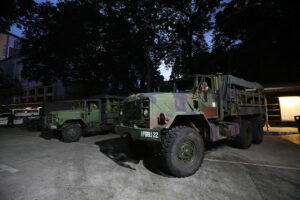What went wrong with the AFP’s modernization?

Why is the Armed Forces of the Philippines (AFP) perennially ill-equipped? Why hasn’t the AFP managed to establish a credible defense posture despite clear and present threats as early as 1995?
In a recently concluded forum on maritime security, Dr. Renato de Castro of the Stratbase Institute provided valuable insights on the botched Armed Forces Modernization Program.
The first attempt to modernize the AFP was during President Fidel V. Ramos time following the withdrawal of US Military bases and subsequent illegal occupation of Mischief Reef by China in 1995. That same year, Republic Act 7898 was enacted into law. RA 7898 outlined the 15-year modernization program of the AFP with a commitment to spend P50 billion within the first five years. Six years after the law was passed, however, Congress had released only P5.7 billion. This is why the AFP remains sorely lacking in military hardware and why we stood defenseless when China expanded its illegal occupation of the West Philippine Sea back in 2012.
Republic Act 7898 bestowed upon Congress the power to determine the objectives of the AFP’s modernization program, the amounts and timing of budgetary releases. And here lay the problem. In progressive countries, military modernization programs are designed and implemented by the military itself, not by lawmakers. After all, the acquisition of military hardware is an exercise of defense planning against internal and external threats, both in peacetime and wartime. No one knows these better than the generals who have trained for it.
Giving Congress the power of approval and the power of the purse politicized the AFP’s modernization. Throughout the 2000s, Congress could not appreciate the urgency of military investments and always found “more urgent” uses of funds. Hence, the underspending on defense capacitation. They micromanaged every aspect of the modernization plan and imposed their preferences, biases, and preferred suppliers. The two Presidents of the era failed to appreciate the urgency of the matter and did little to nothing towards augmenting defense capacitation.
Republic Act 7898 specified that the Philippine Navy would get the lion’s share of the modernization fund to develop its patrol capabilities, surface warfare, and its maritime detection and surveillance capacities. The Philippine Air Force and the Philippine Coast Guard would get the next highest budget allocation. The authors of the law knew that the imminent enemy was China and the theater of engagement would be the West Philippine Sea. Yet, as the years went by, Congress still allocated the bulk of the budget to the Philippine Army.
This is why the Philippines was caught flat footed when China occupied Scarborough Shoal in 2012. Back then, the Navy only had obsolete combatants that included six corvette ships that were actually World War 2 minesweepers. The more modern BRP Gregorio del Pilar was actually a former US Coast Guard Cutter. None of the Navy’s ships were armed with anti-ship or anti-aircraft missiles. This explains why the Philippines was a sitting duck in that Scarborough Shoal standoff.
This prompted the government of President Noynoy Aquino to enact Republic Act 10349. The law was an expanded version of the AFP modernization program. Again, the needs of the Philippine Navy were given the priority.
However, Republic Act 10349 has the same flaws as Republic Act 7898 in that the allocation of financial resources was still subjected to a tedious, legalistic, and complex process with Congress having the final say. It’s also been said that the spending plan was not aligned with the capabilities that needed to be reinforced.
Ideally, the National Defense Strategy should be the basis of the modernization program. In reality, however, the funds were channeled to the General Headquarters and the different services of the AFP as their “fair share.” In other words, the appropriation of budgets was not strategy-driven but politically driven.
Prudent financial management under Aquino’s administration gave Mr. Duterte the financial latitude to spend on armaments. In 2017, the modernization program was given a 15% increase in budget versus the 2016 allocation. The supplemental budget for the AFP’s acquisition of arms was also increased from P15 billion to P25 billion.
In June 2019, President Duterte agreed to bankroll the second phase of the AFP’s modernization program, worth $56 billion. It is an ambitious and expensive program geared towards strengthening our territorial defense capabilities.
But we are far from where we want to be. Despite the Navy’s acquisition of a few combatants in 2020, the majority of its warships are armed only with machine guns which are no match for the arms carried by Chinese warships and fighter planes.
So, what do we do now? As Ferdinand Marcos, Jr. takes over the reins of government, he will do well to immediately convene the National Security Council to formulate a new Security and Defense Strategy.
Dr. De Castro recommends that Republic Act 10349 be repealed and a new AFP modernization law be enacted, the spending plan of which must be based on a Security and Defense Strategy. He further recommends that the power of the purse be removed from Congress and instead, budgets for modernization be fixed at 2% of gross national product, downloaded directly to the AFP by the Department of Budget and Management.
Moreover, the AFP must be weaned from handling internal security issues so it could focus on territorial defense. The Philippine National Police should be made to handle internal issues.
And of course, we cannot take on China alone. We must strengthen our security partnerships with nations forming the Quadrilateral Security Dialogue (QUAD), ANKUS, and ASEAN. Such partnerships are geared not only to secure our territorial sovereignty over the West Philippine Sea but also to ensure the continued freedom of navigation and freedom of overflight in the area.
There is much to do to modernize the AFP and its urgency cannot be over emphasized. We hope that the Marcos government makes this a priority.
Andrew J. Masigan is an economist
Facebook@AndrewJ. Masigan
Twitter @aj_masigan




